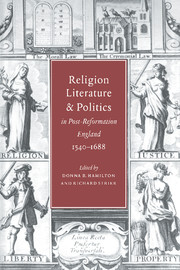Book contents
- Frontmatter
- Contents
- List of contributors
- Introduction
- 1 Sir John Oldcastle as symbol of Reformation historiography
- 2 The “sacred hunger of ambitious minds”: Spenser's savage religion
- 3 Subversive fathers and suffering subjects: Shakespeare and Christianity
- 4 Kneeling and the body politic
- 5 Donne and the politics of devotion
- 6 Catholic, Anglican or puritan? Edward Sackville, fourth Earl of Dorset, and the ambiguities of religion in early Stuart England
- 7 Crucifixion or apocalypse? Refiguring the Eikon Basilike
- 8 Marvell, sacrilege, and Protestant historiography: contextualizing “Upon Appleton House”
- 9 Entering The Temple: women, reading, and devotion in seventeenth-century England
- 10 Contextualizing Dryden's Absalom: William Lawrence, the laws of marriage, and the case for King Monmouth
- 11 Reformation in the Restoration Crisis, 1679–1682
- 12 Shadwell's dramatic trimming
- Index
3 - Subversive fathers and suffering subjects: Shakespeare and Christianity
Published online by Cambridge University Press: 16 October 2009
- Frontmatter
- Contents
- List of contributors
- Introduction
- 1 Sir John Oldcastle as symbol of Reformation historiography
- 2 The “sacred hunger of ambitious minds”: Spenser's savage religion
- 3 Subversive fathers and suffering subjects: Shakespeare and Christianity
- 4 Kneeling and the body politic
- 5 Donne and the politics of devotion
- 6 Catholic, Anglican or puritan? Edward Sackville, fourth Earl of Dorset, and the ambiguities of religion in early Stuart England
- 7 Crucifixion or apocalypse? Refiguring the Eikon Basilike
- 8 Marvell, sacrilege, and Protestant historiography: contextualizing “Upon Appleton House”
- 9 Entering The Temple: women, reading, and devotion in seventeenth-century England
- 10 Contextualizing Dryden's Absalom: William Lawrence, the laws of marriage, and the case for King Monmouth
- 11 Reformation in the Restoration Crisis, 1679–1682
- 12 Shadwell's dramatic trimming
- Index
Summary
The greatest princes and potentates in the world, the most wealthy and haughty of us all, but for one poor beggar had been irrecoverably miserable
Isaac Barrow, Spital Sermon (1671)For Gold and Grace did never yet agree:
Religion alwaies sides with povertie.
George Herbert, The Church MilitantSUBVERSIVE FATHERS
The recent lack of interest in the religious significance of Shakespearean drama stems in part from a suspicion that it possessed no such significance. As R. M. Frye showed many years ago, the notion of religious literature is alien to the humanist poetics of the sixteenth century, which valued “poesie” for its ethical rather than redemptive force. The royal proclamations censoring plays that touched on matters of religion (issued under Henry, Mary, Elizabeth, and James) seem to corroborate Frye's argument: Protestant Englishmen did not seem very enthusiastic about staging the mysteries of faith.
But if it is not plausible to read Shakespeare's plays as Christian allegories, neither is it likely that the popular drama of a religiously saturated culture could, by a secular miracle, have extricated itself from the theocentric orientation informing the discourses of politics, gender, social order, and history. The issue which has been ignored is not whether Shakespeare teaches Christian doctrine – this is either a red herring or twice-cooked cabbage – but how religious ideology, understood not as a uniquely privileged “key” but as part of a cultural system, functions in these plays.
- Type
- Chapter
- Information
- Publisher: Cambridge University PressPrint publication year: 1996
- 6
- Cited by



